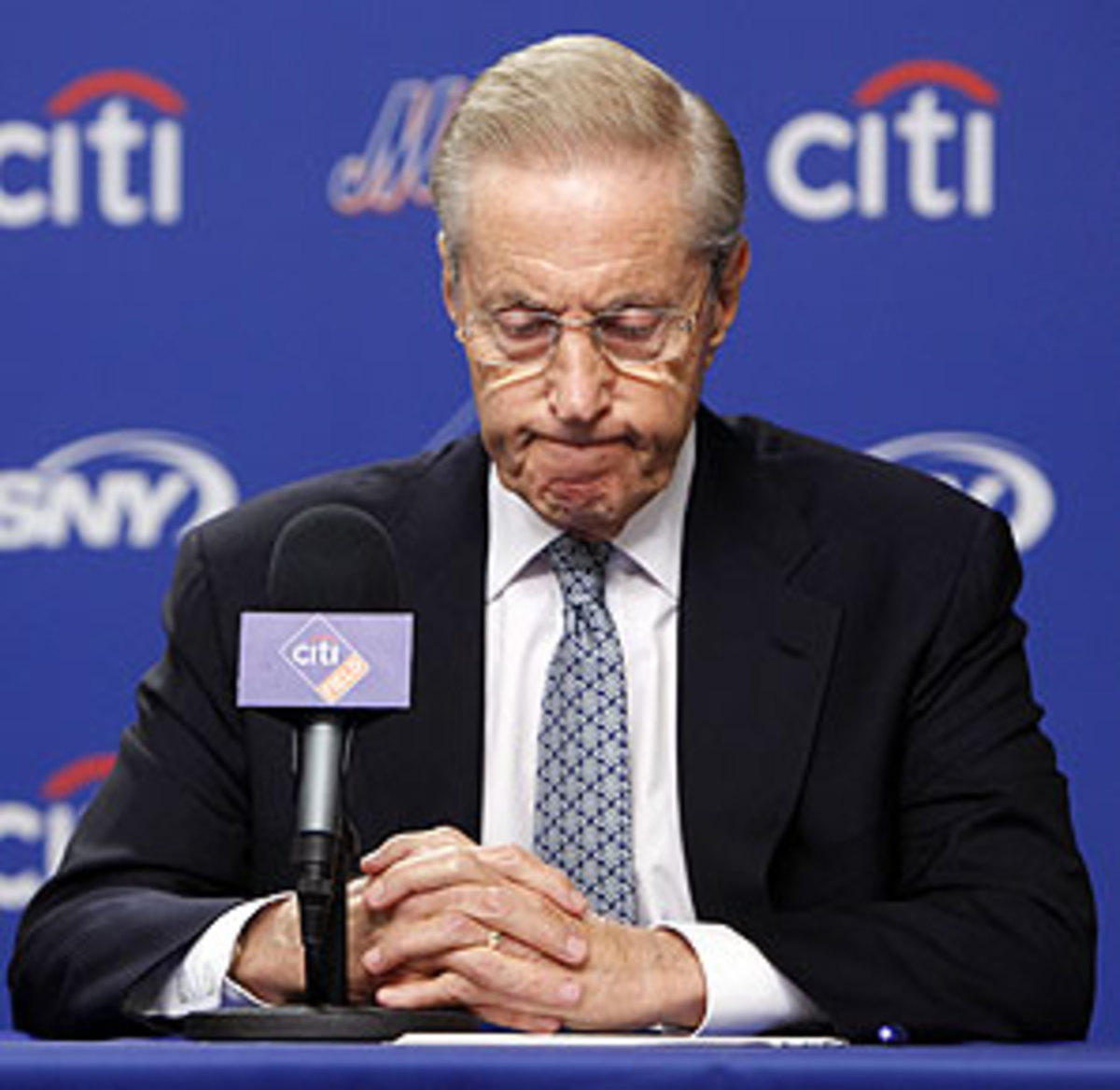
This isn't the first time that Fred Wilpon trusted the wrong man
In spring training 2004, when news leaked that the Mets were considering trade proposals for Jose Reyes, principal owner Fred Wilpon walked onto the field where Reyes was taking ground balls, threw an arm around the 20-year-old shortstop, and whispered in his ear, "You're not going anywhere."
The gesture was vintage Wilpon, for whom loyalty is a defining characteristic. He grew up in Brooklyn, and when there was an opportunity to bring professional baseball back to his home borough, he co-founded the minor-league Brooklyn Cyclones. He went to college at the University of Michigan, and when the Wolverines baseball team took their annual spring-break trip to Florida, he always arranged for them to play the Mets. When Citi Field was constructed, he made sure the design evoked Ebbets Field, with a rotunda in honor of Jackie Robinson.
Wilpon's sense of allegiance earned him equal parts admiration and criticism. He stuck with Mike Piazza long after the deteriorating catcher should have been banished to the American League. He was equally patient with captain and closer John Franco. He defended general manager Steve Phillips through a sexual harassment scandal. His devotion to washed-up players and scouts cost him games and money. His devotion to Bernie Madoff will cost him much more.
When Madoff's $65 billion Ponzi scheme was exposed more than two years ago, Wilpon came off as another sympathetic dupe, deceived by a con artist. But in light of the recent lawsuit alleging that Wilpon and his partners actually profited from the scheme -- combined with reports by The New York Times that Wilpon and Madoff were close friends for more than 20 years -- it is much harder to play the victim. The suit accuses Wilpon of accepting astronomical investment returns from Madoff despite warning signs that they were too good to be true.
Looking at Wilpon's real estate empire, it is hard to believe he could be so gullible. Looking at his baseball franchise, it's not hard to believe at all. This is the man who signed off on the contracts of Bobby Bonilla and Jeromy Burnitz, Mo Vaughn and Kazuo Matsui, Pedro Astacio and Oliver Perez. He once said that Art Howe, a decent manager but hardly a charismatic one, "lit up the room." Wilpon has been more successful evaluating land than judging character. That he went on vacations with Madoff, supported the same charities and raised his family in the same Long Island town proves only what Mets fans already knew: Wilpon often trusts the wrong people.
The last four years, ever since Adam Wainwright froze Carlos Beltran with the bases loaded in Game 7 of the 2006 NLCS, have been torturous for the Mets. One September collapse was followed by another, which was followed by an injury epidemic, two fourth-place finishes and an assault charge courtesy of closer Francisco Rodriguez. But this lawsuit is the most damaging development yet, and if the Mets want to know why, they can fly to Los Angeles.
Wilpon is obviously not going through a divorce, like Dodgers owner Frank McCourt, but he has already acknowledged that he is seeking investors to buy 20-25 percent of the club and a prolonged legal battle could force him to sell more. The specter of a lawsuit will hang over the Mets as it has the Dodgers, and even if it does not affect personnel decisions or payroll, the perception that it does will be impossible to avoid. The Mets hoped to start fresh this season with new general manager Sandy Alderson and manager Terry Collins, but the same cloud keeps following them, pausing only to change shape.
The teams in the two biggest National League markets -- the Dodgers and Mets -- are both in flux. If McCourt is bought out, Dodgers fans will rejoice, and if Wilpon is also forced to sell, some Mets fans will react the same way. But in an era when sports franchises are run like ruthless corporations, Wilpon really has operated his more like a family business, understanding that sentiment is part of the game.
In the fall of 2004, Wilpon hired Omar Minaya and Willie Randolph. While he was obviously swayed by their credentials, he could also appreciate a Latino general manager from Queens and an African-American manager from Brooklyn, uniting the city's second team. They took the Mets to within one game of the World Series, and when it became clear in subsequent years that Minaya had lost his way, Wilpon struggled to make the change. Minaya grew up with the Mets. He joined the organization as a low-level staffer. He, too, was part of its roots.
Wilpon has grown increasingly private in recent years, weary of media attention, but most of that was reserved for his club. This is personal. After the lawsuit was unsealed on Friday, Wilpon and his partners called the accusations "abusive, unfair and untrue" in a statement, adding, "We categorically reject them. We should not be made victims twice over."
The question is whether Wilpon was aided by a friend, or betrayed. If betrayed, it wasn't the first time.





